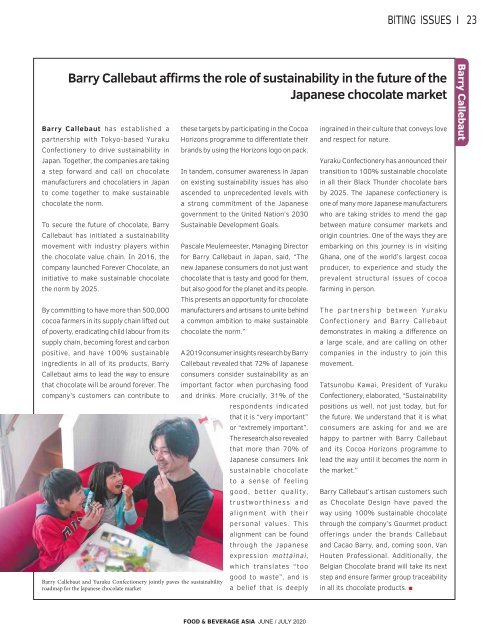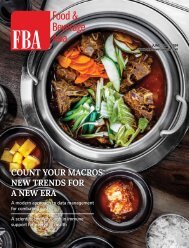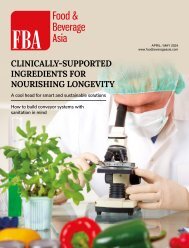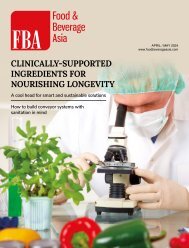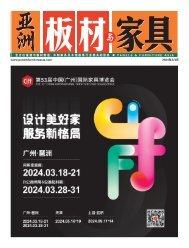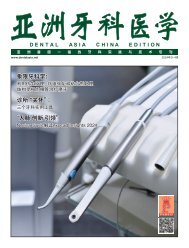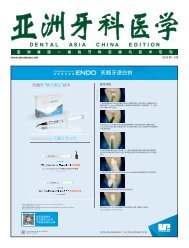Food & Beverage Asia June/July 2020
Food & Beverage Asia (FBA) is the leading source of food and beverage news in Asia since 2002. FBA delivers a comprehensive view of the food and beverage landscape, spanning across the latest health and nutrition trends and industry innovations in ingredients, recipe formulations, food science, sustainability, packaging, and automation, as well as advancements in agri and food-tech.
Food & Beverage Asia (FBA) is the leading source of food and beverage news in Asia since 2002. FBA delivers a comprehensive view of the food and beverage landscape, spanning across the latest health and nutrition trends and industry innovations in ingredients, recipe formulations, food science, sustainability, packaging, and automation, as well as advancements in agri and food-tech.
You also want an ePaper? Increase the reach of your titles
YUMPU automatically turns print PDFs into web optimized ePapers that Google loves.
BITING ISSUES 23<br />
Barry Callebaut affirms the role of sustainability in the future of the<br />
Japanese chocolate market<br />
Barry Callebaut has established a<br />
partnership with Tokyo-based Yuraku<br />
Confectionery to drive sustainability in<br />
Japan. Together, the companies are taking<br />
a step forward and call on chocolate<br />
manufacturers and chocolatiers in Japan<br />
to come together to make sustainable<br />
chocolate the norm.<br />
To secure the future of chocolate, Barry<br />
Callebaut has initiated a sustainability<br />
movement with industry players within<br />
the chocolate value chain. In 2016, the<br />
company launched Forever Chocolate, an<br />
initiative to make sustainable chocolate<br />
the norm by 2025.<br />
By committing to have more than 500,000<br />
cocoa farmers in its supply chain lifted out<br />
of poverty, eradicating child labour from its<br />
supply chain, becoming forest and carbon<br />
positive, and have 100% sustainable<br />
ingredients in all of its products, Barry<br />
Callebaut aims to lead the way to ensure<br />
that chocolate will be around forever. The<br />
company’s customers can contribute to<br />
Barry Callebaut and Yuraku Confectionery jointly paves the sustainability<br />
roadmap for the Japanese chocolate market<br />
these targets by participating in the Cocoa<br />
Horizons programme to differentiate their<br />
brands by using the Horizons logo on pack.<br />
In tandem, consumer awareness in Japan<br />
on existing sustainability issues has also<br />
ascended to unprecedented levels with<br />
a strong commitment of the Japanese<br />
government to the United Nation’s 2030<br />
Sustainable Development Goals.<br />
Pascale Meulemeester, Managing Director<br />
for Barry Callebaut in Japan, said, “The<br />
new Japanese consumers do not just want<br />
chocolate that is tasty and good for them,<br />
but also good for the planet and its people.<br />
This presents an opportunity for chocolate<br />
manufacturers and artisans to unite behind<br />
a common ambition to make sustainable<br />
chocolate the norm.”<br />
A 2019 consumer insights research by Barry<br />
Callebaut revealed that 72% of Japanese<br />
consumers consider sustainability as an<br />
important factor when purchasing food<br />
and drinks. More crucially, 31% of the<br />
respondents indicated<br />
that it is “very important”<br />
or “extremely important”.<br />
The research also revealed<br />
that more than 70% of<br />
Japanese consumers link<br />
sustainable chocolate<br />
to a sense of feeling<br />
good, better quality,<br />
trustworthiness and<br />
alignment with their<br />
personal values. This<br />
alignment can be found<br />
through the Japanese<br />
expression mottainai,<br />
which translates “too<br />
good to waste”, and is<br />
a belief that is deeply<br />
ingrained in their culture that conveys love<br />
and respect for nature.<br />
Yuraku Confectionery has announced their<br />
transition to 100% sustainable chocolate<br />
in all their Black Thunder chocolate bars<br />
by 2025. The Japanese confectionery is<br />
one of many more Japanese manufacturers<br />
who are taking strides to mend the gap<br />
between mature consumer markets and<br />
origin countries. One of the ways they are<br />
embarking on this journey is in visiting<br />
Ghana, one of the world’s largest cocoa<br />
producer, to experience and study the<br />
prevalent structural issues of cocoa<br />
farming in person.<br />
The partnership between Yuraku<br />
Confectionery and Barry Callebaut<br />
demonstrates in making a difference on<br />
a large scale, and are calling on other<br />
companies in the industry to join this<br />
movement.<br />
Tatsunobu Kawai, President of Yuraku<br />
Confectionery, elaborated, “Sustainability<br />
positions us well, not just today, but for<br />
the future. We understand that it is what<br />
consumers are asking for and we are<br />
happy to partner with Barry Callebaut<br />
and its Cocoa Horizons programme to<br />
lead the way until it becomes the norm in<br />
the market.”<br />
Barry Callebaut’s artisan customers such<br />
as Chocolate Design have paved the<br />
way using 100% sustainable chocolate<br />
through the company’s Gourmet product<br />
offerings under the brands Callebaut<br />
and Cacao Barry, and, coming soon, Van<br />
Houten Professional. Additionally, the<br />
Belgian Chocolate brand will take its next<br />
step and ensure farmer group traceability<br />
in all its chocolate products. ■<br />
Barry Callebaut<br />
FOOD & BEVERAGE ASIA JUNE / JULY <strong>2020</strong>


